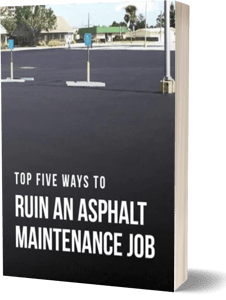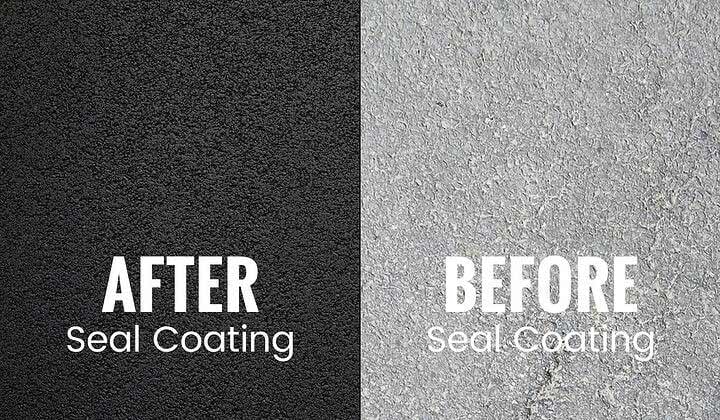Updated August 7, 2022
Coal tar sealer has been one of our bestselling products of all time. But times are changing, and coal tar sealer isn't always going to be available. This is going to affect all our customers in the US and Canada.
But don't fret! Asphalt emulsion sealer is available from the Asphalt Kingdom website. It's the most viable alternative to coal tar emulsion, but it takes some getting used to if you've been using coal tar for many years.
We know that you have questions, so we'll answer all of them below.
FREE DOWNLOAD!

Get your FREE ebook on how not to ruin your asphalt
Table of Contents
- Why is coal tar sealer being phased out?
- What's your alternative to coal tar sealer?
- What are the pros of using asphalt emulsion?
- What are the cons of using asphalt emulsion sealer?
- I'm switching to asphalt emulsion. What are the things that I need to keep in mind?
- How do you store asphalt emulsion sealer safely?
- Conclusion
Why is coal tar sealer being phased out?

Watch Judd Burdon talk about the coal tar sealer shortage
Coal tar sealer’s supply is fluctuating. One reason is the shortage of raw materials used to make this product. Coal tar and its components are mostly imported from overseas, so this shortage puts manufacturers in a difficult position.
One of the top suppliers of raw materials used to produce coal tar sealers is Russia. The international community recently imposed economic sanctions on the country due to its war on Ukraine. Because of this, Russia cannot export coal and other raw materials to several countries anymore, including the United States and Canada.
Another issue with coal tar is that the material has long posed a threat to the environment and people's health. Coal tar contains high amounts of polycyclic aromatic hydrocarbons or PAHs, and these compounds are known to cause certain types of cancers. Plus, coal tar is caustic, so it can cause skin irritation and burns if it comes into contact with your exposed skin.
Related: Getting Your Asphalt Sealcoating Machine Ready
Apart from health hazards, PAHs are also toxic to fish and other wildlife. Because of its toxicity, coal tar has been prohibited for use as a sealer in many states.
What's your alternative to coal tar sealer?
High-quality asphalt emulsion is the next best thing to coal tar sealer. We have it available on our website in 55-gallon drums, pallets, or 275-gallon totes.
What are the pros of using asphalt emulsion?
There are several advantages to using asphalt emulsion. Here are some of them.
- Raw materials used to manufacture asphalt emulsion are sourced locally, so we will not be vulnerable to shortages, sanctions, and supply chain problems.
- It's better for the environment. Asphalt emulsion is not as hazardous to aquatic life and wildlife compared to coal tar sealer. Just make sure to dispose of any excess product properly to prevent it from becoming a pollutant.
- It's not as toxic as coal tar sealer. We mentioned above that coal tar sealers contain high concentrations of PAHs. These are compounds that can cause cancer and irritation. But let's be clear: asphalt emulsions also contain compounds that are hazardous to your health.
The good news is asphalt emulsion is not as toxic as coal tar sealer. Plus, you can greatly reduce your exposure to toxic compounds in asphalt emulsion by wearing proper personal protection equipment. - Asphalt emulsion dries darker than coal tar sealer. Coal tar only produces a dark gray color. Meanwhile, asphalt emulsion really brings out the beauty of your clients' properties with its pitch-black color.
What are the cons of using asphalt emulsion sealer?
- It needs more frequent applications. We have to admit that coal tar has an edge over asphalt emulsion when it comes to longevity.
The upside with using asphalt emulsion sealer is that you can get frequent repeat business if you're going to use it without additives. But you can also get results similar to coal tar sealer if you use additives. - For best results, only apply asphalt emulsion when temperatures are 55°F and above. Because of this, your season is going to be a lot shorter than when you were using coal tar.
I'm switching to asphalt emulsion. What are the things that I need to keep in mind?
- Always follow the manufacturer's instructions for diluting and spraying asphalt emulsion. Coal tar sealers are very forgiving when it comes to dilution. But you need to be more precise if you're using asphalt emulsion. Never overdilute the mixture, or you'll end up with dirty water.
Related: Sealcoating and Crack Repair Safety Checklist

Learn more about asphalt sealcoat additives
- Use additives if you want faster drying and curing times. Browse our asphalt sealer store for asphalt emulsion additives, or give us a call to see which additive is perfect for your application. Want to apply asphalt emulsion with additives for large commercial projects? You'll want an AirBoss 300 air-operated spray system. For residential projects, you can use a quality sealcoat brush.
- Inform your customer beforehand that the parking lot or driveway will show tire marks and scuff marks a few days after the application of the sealer. Reassure them that this is entirely normal, and those marks will fade with time.
- Asphalt emulsion is not as thick as coal tar. Always leave plenty of sealer on the surface, so the solids in the material truly seal the surface.
- All Asphalt Kingdom spray systems are compatible for use with asphalt emulsion sealer.
How do you store asphalt emulsion sealer safely?
Asphalt emulsion sealer is an eco-friendly asphalt sealant, and thus has bacteria in it that can build and expand when exposed to the sun or heat. There are several things you can do to prevent and reduce the pressure build-up:
- Keep barrels and totes stored at room temperature out of direct sun. Storage in direct sunlight and heat can create expansion and pressure.
- Relieve pressure on totes and barrels by opening the small screw top on the container. Use a large rag to cover the opening as the smaller hole is being removed to prevent sealer from spraying out the top of the lid and to prevent potential injury from the lid popping off. You can also leave the screw top loose to allow air to flow freely.
- You can add bleach to your asphalt emulsion to kill and reduce bacteria. If you're already experiencing swelling, you can add 1/2 gallon to 1 gallon of bleach per 100 gallons of sealer. If you want to do this as a preventative measure every week, add 1/4 gallon to 1/2 gallon per 100 gallons of sealer. Then agitate thoroughly.
- If swelling has already occurred, you can remove product from the container to reduce spillage.
- Cover barrels and totes to prevent the possibility of overspray issues from pressure build-up.
Conclusion:
The past few years have brought a lot of changes, but we have to adjust and make the most out of it. If you need help with asphalt emulsion sealer, simply give us a call or drop us a line.










.jpg)